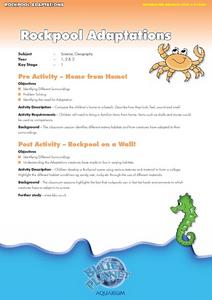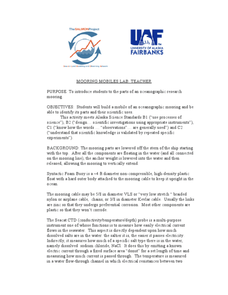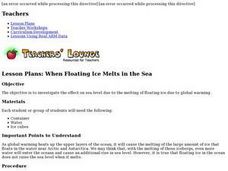Curated OER
1492: Using Data to Explain a Journey
Learners examine how Christopher Columbus made his way across the Atlantic. In this data lesson plan students use an Internet program to navigate like Columbus.
Curated OER
Oceans and Islands Quiz 1
In this oceans and islands learning exercise, learners answer short answer questions about oceans and islands all around the world. Students complete 10 questions.
Curated OER
Mixed Media Ocean Art
Students design pictures of ocean environments. In this art lesson, students use mixed media art materials to develop a picture that depicts the ocean environment. They use paint, sand paper and various basic art materials.
Curated OER
Rockpool Adaptations
In this rockpool adaptations worksheet, young scholars study a rockpool habitat and compare it to their own habitat. Students use their senses to describe a rockpool habitat. They bring in items from home and items from a beach to make...
Curated OER
Marine Fisheries Management
Almost 200 slides make this a vast collection! It is a quirky collection, titled "Marine Fisheries Management," but having little to do with that occupation. What you will find are two-toned blue backgrounds with no pictures, but a few...
Curated OER
Ocean Streams
The instructions for demonstrating ocean turnover are provided in this resource. You could set this up for your earth science class as part of a lecture on convection currents or as an explanation of how ocean currents form. An animation...
Curated OER
Aquatic Safari
Students use an Internet Web site to locate the scientific information about various marine species. They use the Internet to find the scientific information about marine animals.
Curated OER
Mooring Mobiles Lab
Oceanography experts use candy to construct a model of a bio-physical mooring that would test a variety of factors. Each piece of equipment to be included on the mooring is described within the write-up. As pupils gather the candies for...
Curated OER
Seashore Explorers
There are three separate lessons within this resource that can be used together, or that can each stand alone. In the first, five simple activities allow junior scientists to examine the amazing properties of water. In the second, they...
Curated OER
Down in the Dumps
After an introduction to municipal sludge, middle school ecologists consider the pros and cons of dumping in the Hudson River Canyon. The class is split into two groups: one to debate in favor or dumping and one to debate against the...
Curated OER
Marine Biology - The Story of Waves
When teaching about the movement of water in the ocean, this PowerPoint will be a terrific support. It covers how waves break and how they are generated. The causes of tides and tsunamis are also detailed. A couple of changes could make...
Curated OER
Dissolved Gases in Water
Using different types of water, earth science explorers set out to prove the ocean's ability to absorb greenhouse gases. They shake, heat, and freeze the water samples to examine gas content. This lesson is useful during a unit...
Curated OER
Where Does Water Come From?
Perfect for children in pre-K through 1st grade, this presentation provides simplified information about the water cycle. While no academic language is used, the water cycle is fully represented in clear and easy-to-follow slides. This...
Curated OER
All Around the World
In this geography worksheet, students name the 7 continents of the world (there are some letter clues) and a country in each. Students then name the 5 oceans.
Curated OER
Trade in the Indian Ocean: Should China End Zheng He's Treasure Voyages?
Students examine the amount of trade that occurs in the Indian Ocean. Using China as an example, they discuss the reasons why it ended its treasure voyages in the area and predict what would have happened if the voyages continued. They...
Curated OER
Caught in a Net
Students read and discuss the bycatch of the sea and the economic impact of taking bycatch away. In this bycatch lesson plan, students discuss the rights of fisherman and observe pictures of sea animals.
Curated OER
Ocean Animals - A Kindergarten Research Project
Something’s fishy! Assign each of your pupils an individual sea creature and investigate the oceans. Young oceanographers utilize Kidspiration software to research a creature, illustrate an image, and create fact cards about their...
Curated OER
When Floating Ice Melts in the Sea
With this simple inquiry exercise young scientists observe the effects of melting ice on water level. Set up an easy experiment with floating ice cubes in a dish of water then have your pupils make and record their observations of the...
Curated OER
Rhythmic Movement
Explore how waves move in the ocean with your young learners. Fill a two-liter bottle half full with colored water, and have the youngsters move the bottle to make waves inside of it. Then have them listen to the song "Wipe Out"....
Curated OER
Oceans: Reading Comprehension
Practice reading comprehension by approaching oceanography through 2 pages of informational text. The text give introductory coverage of oceanography in practice, ocean zones, names of the 5 oceans, ocean features, and marine life. Three...
Curated OER
Marine Animals on the Move
Students work with partners to track tagged animals using real-time data from satellites. Students gather and analyze data, compile information and conclusions and then prepare a final presentation of their research.
Curated OER
Tall as a Mountain, Flat as a Plain
Students examine a variety of landforms that are found on the Earth and compare and contrast the distinguishing qualities of these forms. A topographical model of the landforms is made.
Curated OER
The Oceans
Learners read books and create a classroom museum based upon things they learn about the ocean. In this ocean lesson plan, students use 2 weeks to read and complete activities on the culture and environment of the ocean.
Curated OER
What is Earth Science?
This activity tests general knowledge of scientific fields with a focus on those involved in earth science. Learners fill in 9 blanks using the provided word bank of scientific fields. In addition, there are 2 questions specifically...

























